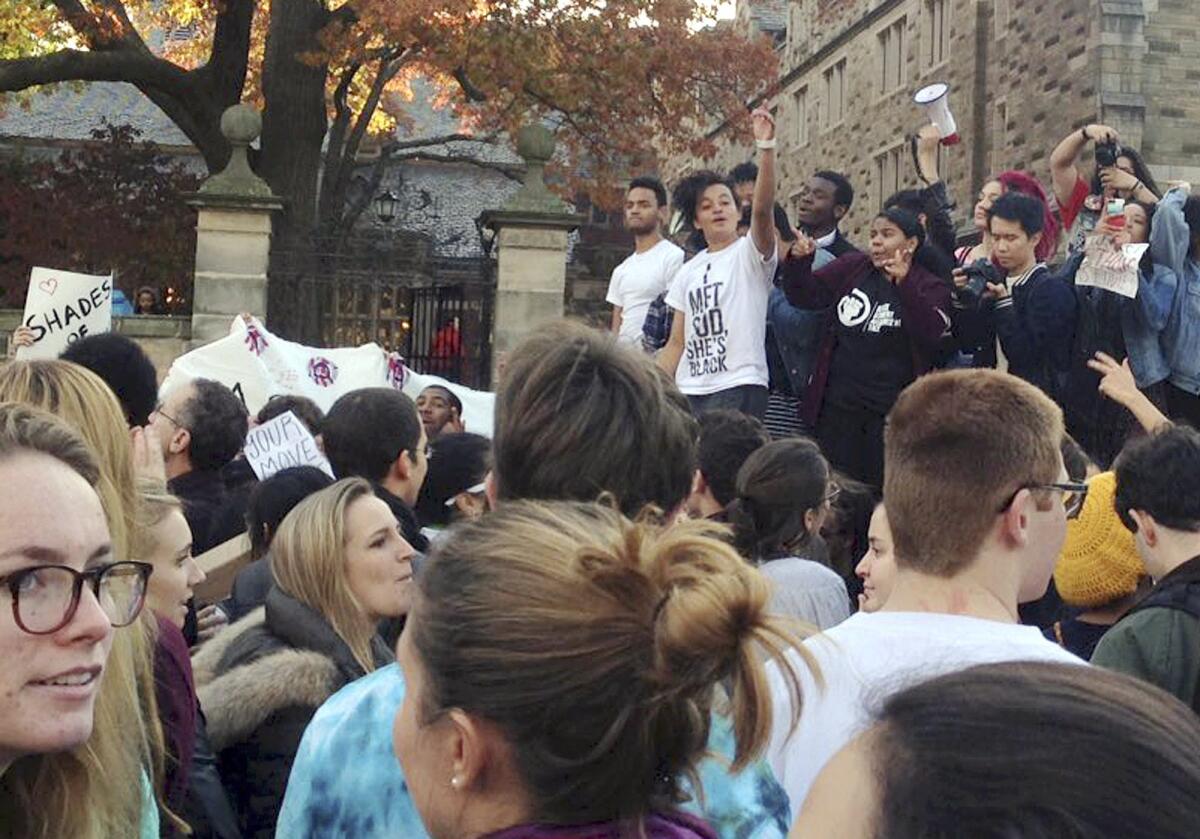The delicate little flowers on today’s college campuses

Yale University students and supporters participate in a march across campus to demonstrate against what they see as racial insensitivity at the Ivy League school on Nov. 9.
- Share via
It seems like every week there’s a new horror story of political correctness run amok at some college campus.
A warning not to wear culturally insensitive Halloween costumes sparked an imbroglio at Yale, which went viral over the weekend. A lecturer asked in an email, “Is there no room anymore for a child to be a little bit obnoxious … a little bit inappropriate or provocative or, yes, offensive?”
Students went ballistic. When an administrator (who is the lecturer’s spouse) defended free speech, some students wanted his head. One student wrote in an op-ed (now taken down), “He doesn’t get it. And I don’t want to debate. I want to talk about my pain.”
We’re raising millions of kids to be smart and kind, but also fragile.
Washington Post columnist (and Tufts professor) Daniel Drezner was initially horrified by the spectacle but ultimately backtracked. Invoking Friedrich Hayek’s insights from “The Use of Knowledge in Society,” Drezner cautions outside observers that “there is an awful lot of knowledge that is local in character, that cannot be culled from abstract principles or detached observers.”
As a Hayek fanboy and champion of localism, I should be quite sympathetic. But this time, I think Drezner’s initial reaction was closer to the mark. The notion that the Yale incident is an isolated one defies all of the evidence.
Jonathan Haidt, a social scientist, and Greg Lukianoff, president of the Foundation for Individual Rights in Education, recently wrote a sweeping survey titled “The Coddling of the American Mind” for the Atlantic, in which they cataloged how students are being swaddled in an emotional cocoon.
Taco bars at fraternity fundraisers are considered offensive. A group at Duke University deemed phrases such as “man up” too horrible to tolerate. And so on.
The suggestion that the tempest at Yale is an isolated incident reminds me of my favorite line from Thoreau: “Some circumstantial evidence is very strong, as when you find a trout in the milk.”
So what is going on?
Well, a lot. Many conservatives want to put all the blame on political correctness or cultural Marxism. And though I think such ideologies certainly belong in the dock, political correctness is now quite old.
Lamentations about it were commonplace when I was in college 25 years ago. Does anyone, other than a few campus hotheads, actually believe universities are more intolerant, bigoted and racist than they were a generation ago?
What has changed are the students. Yes, there has been a lot of ideological indoctrination in which kids are taught that taking offense gives them power. But, again, that idea is old. What’s new is the way kids are being raised.
Consider play. Children are hard-wired to play. That’s how we learn. But what happens when play is micromanaged? St. Lawrence University professor Steven Horwitz argues that it undermines democracy.
Free play — tag on the schoolyard, pickup basketball at the park, etc. — is a very complicated thing. It requires young people to negotiate rules among themselves, without the benefit of some third-party authority figure. These skills are hugely important in life. When parents or teachers short-circuit that process by constantly intervening, to stop bullying or just to make sure that everyone plays nice, Horwitz argues, we take “away a key piece of what makes it possible for free people to be peaceful, cooperative people by devising bottom-up solutions to a variety of conflicts.”
The rise in “helicopter parenting” and the epidemic of “everyone gets a trophy” education are another facet of the same problem. We’re raising millions of kids to be smart and kind, but also fragile.
And what happens when large numbers of these delicate little flowers are set free to navigate their way through life? They feel unsafe and demand “safe spaces.” They feel threatened by uncomfortable ideas and demand “trigger warnings.” They might even want written rules or contracts to help them negotiate sexual relations.
In other words, this is the generation the mandarins of political correctness have been waiting for.
jgoldberg@latimescolumnists.com
Follow the Opinion section on Twitter @latimesopinion and Facebook.
MORE FROM GOLDBERG:
Just the ticket for the GOP: Cruz and Rubio
Why Obama prefers politicizing to actual politics
Why family matters, and why traditional families are still best
More to Read
A cure for the common opinion
Get thought-provoking perspectives with our weekly newsletter.
You may occasionally receive promotional content from the Los Angeles Times.










